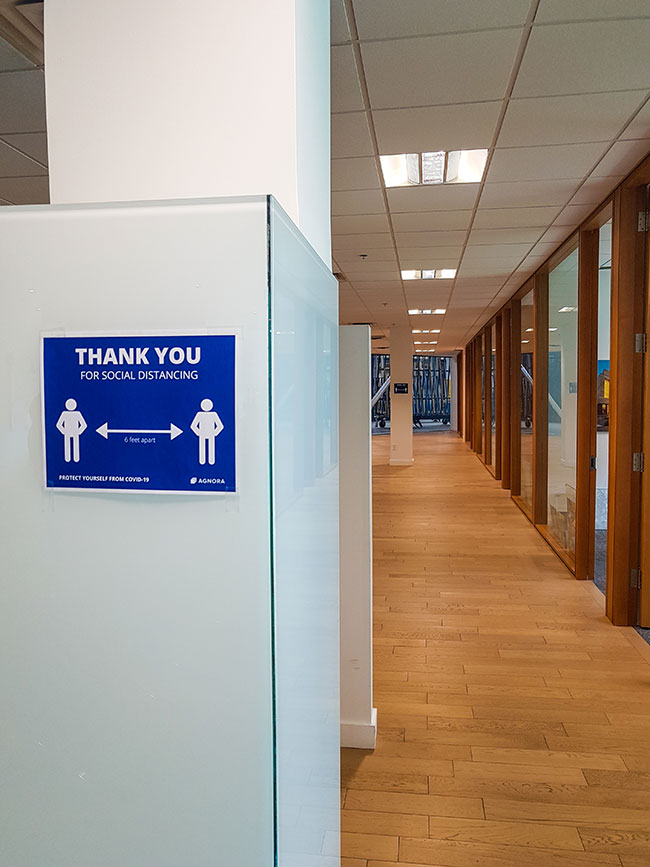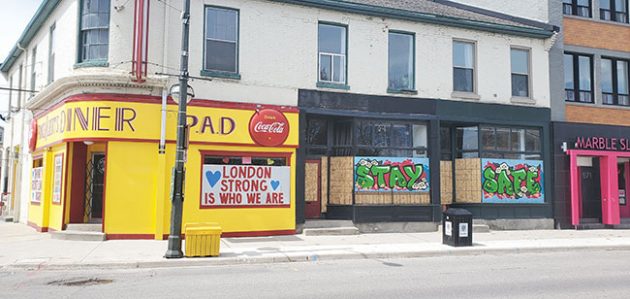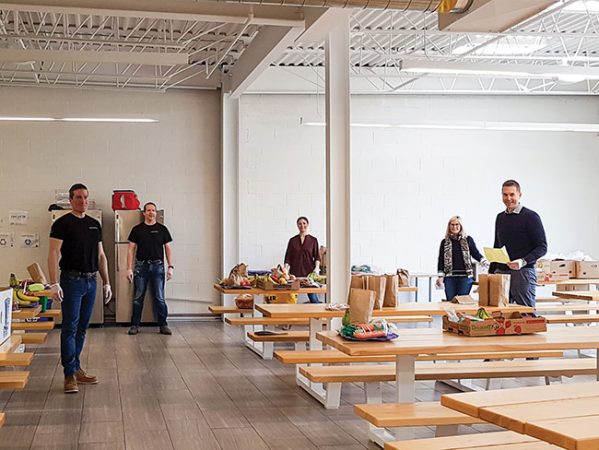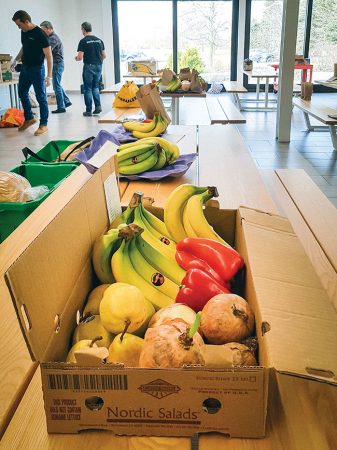
Features
Community
What We Did In The Pandemic – COVID stories from the Canadian glazing industry
Reports from the glazing frontlines
June 18, 2020 By Treena Hein
 Sometimes it’s remarkable to see how fast things have changed. Companies have had to scramble to do a million little things – like make social distancing signs.
Sometimes it’s remarkable to see how fast things have changed. Companies have had to scramble to do a million little things – like make social distancing signs.
While Canadians and the rest of the world wait for the spread of COVID-19 to hopefully decrease, owners and managers of glass businesses in Canada are doing exactly what their peers in other sectors are doing: their best.
Direct prevention of infection and spread, finding work where possible, using spare time effectively, helping out the community – this and more is the temporary new normal. But while this pandemic is extremely stressful to be sure, as you will read below, glass business owners, as they always have, are using their skills, experience and ingenuity to weather the storm. Please note that these reports were gathered in early-to-mid April.
Let’s jump in and check on Provincial Glass, which has served residential and commercial customers in London, Ont., and surrounding areas since 1983. “We do windows, patio doors, shower enclosures for homes and for property managers in apartment buildings and condos,” says president and owner, Brett Lucier. “We also have a 24/7 emergency service.”
Business was down significantly in March and while April was looking worse, Lucier’s focus at that point was to get as much work as possible in emergency services and asset protection. That is, through previous relationships, social media and networking, Provincial Glass branched out in March and April into board-ups (applying boards to protect business windows and doors from break-ins), applying security film, putting in bars/gates and installing partitions at store checkouts and in medical offices. “Some coverage in newspapers has also helped,” said Lucier. “We’re also getting calls all the time from people who want us to do shower enclosures and so on, and the dam is building and when we are allowed to go into residences, we will have a lot of work. But I’m really concerned that when restrictions are eased, people won’t hold to the existing restrictions and the easement will have to be reversed. That would be disastrous.”
Cascadia Window and Door in Langley, B.C., was fortunate as of late April to not have suffered a reduction in production of its fibreglass-framed windows and doors, of which about 80 per cent are exported to the U.S. “We have had a small slowdown in quotes, and we have concerns about the long-term effects of the pandemic on construction,” said president Mike Battistel. “There will be a slowdown of some size but there’s no way to know it now. A large percentage of our projects are commercial construction such as schools and hospitals, so the impact on us will likely be less than manufacturers that work on exclusively residential.”
To make sure employees stay safe, the first action Battistel took was have all office staff work at home. And to keep plant staff safe, Battistel created a COVID-19 safety officer role and filled it with a new hire. “It’s actually someone who worked for us several years ago, Ben Ricketts, who had gone into sports coaching and his current job as a technical director of a volleyball club is on hold. So it’s a perfect fit,” Battistel explains. “He does an interview with every worker on the morning and afternoon shifts, disinfects common surfaces and documents everything. He also reminds employees to stay two meters away from each other. If workers have to work within two meters, which is rare, they use respirators.”
Prior to the outbreak, the shifts would overlap by a few minutes so that workers could explain what they’d been working on, but now only shift managers do this, and everything is thoroughly disinfected between the shifts as well. Anyone with any type of cold or flu stays home and Battistel is offering lots of overtime hours in case they do have to take time off and want to make it up. “We’re also staggering lunch and break times and we’ve spent a lot of time sourcing masks and hand sanitizer,” he says. “With the protective gear, the dedicated COVID-19 safety officer and everything on the whole, we are glad our employees feel comfortable.”

London, Ont.’s, iconic Prince Albert Diner, boarded up by Provincial Glass. Glazing contractors are finding work where they can.
Feet to the fire
During this pandemic and always, members of the Architectural Glass and Metal Contractors Association (AGMCA, which has represented unionized glazing contractors of Ontario since 1979) put health and safety of employees first. Executive director Noel Marsella reports that all members are enforcing disease spread prevention protocols such as distancing, masks and handwashing stations. The number of people in onsite elevators is limited, and vehicles must only carry the driver. Some sites are also performing temperature checks.
“After the health and well-being of all employees,” said Marsella in late April, “the survival of our member’s businesses is paramount. Related to that is an industry-wide concern over possible liabilities related to finishing construction contracts according to initially laid-out timelines. Because the general contractors are liable for not completing contracts on time, they are holding their subcontractors’ (our members’) feet to the fire to get projects done on time. Members have been receiving letters that point out penalties associated with delays. The standard contract language and most ‘force majeure’ clauses do not cover this pandemic.”
To finish contracts, companies certainly need enough workers, but productivity is also hampered by biosecurity protocols. Material availability is also a growing worry. And while AGMCA members are hoping for the best on all these fronts, they are also asking for regulatory change. Marsella explained in late April that that the AGMCA, as part of a larger industry group of Ontario Construction Associations, called on all its members in April to send emailed letters to the government, requesting that contractors/subcontractors be exempt from liability for project delays due to COVID-19.
This all relates, however, to the small amount of construction still going on in Ontario in April, about 20 per cent of normal. That includes infrastructure, health care facilities (a hospital in Vaughn where Marsella says three glazing companies are working, another hospital in Brockville and a few other projects), residential construction that was already underway, and service work. “As projects sit idle, financing costs, insurance costs, bonding costs and in some cases even equipment rental costs are just a few of the expenses that will continue to accrue,” he noted. “None of these costs were anticipated when the projects were bid and there will have to be a further discussion on how they will be addressed so that bankruptcies do not skyrocket.”
At Agnora in Collingwood, Ont., they are using physical distancing, have added hand sanitizers, and have stepped up cleaning of common surfaces. Marketing manager Adam Mitchell reports that a staff member who lives on a farm has organized a workplace food order and packaging system so staff members and their vulnerable loved ones don’t have to go to the grocery store or go less often. As of early April, food businesses were regularly dropping off food ordered ahead of time, where staff then placed the appropriate items in boxes for the specific families and individuals according to their orders. The businesses included a bakery, butcher, produce-seller, chocolatier and a local restaurant called The Kitchen, which makes frozen lasagnas.
- Together apart. Agnora employees host a “farmer’s market” while keeping up their distancing.
Here are some additional reports from the front line, slightly condensed from glass companies in Ontario and B.C.:
Neal Turner
General manager, Westeck Windows and Doors, Chilliwack, B.C.
“The impact has been significant. In order to ensure the safety of our workers, customers and society at large, we’ve needed to change the way we do business in almost every aspect.
We currently have approximately 70 per cent of all administration and sales staff working from home. Physical distancing has been incorporated in all remaining functions, from production work to boardroom meetings. We have recognized that implementing all the best practices to stay safe and heathy is only the start. Consistent communication and collaboration with our staff are more important now than ever before.
With the June 1 commercial launch of our new innovative, high-performance slider, casement and casement combo windows, Westeck is optimistic about the year ahead. In general terms of the industry at large, I anticipate a major repositioning of market share. Small and overleveraged manufacturers will either close their doors or be consolidated.”
Paul Warltier
Retail manager, Competition Glass Company, Kelowna, B.C.
“We are having to commit significant time and additional resources into ensuring that the jobsites are safe for our employees to enter. In the case of private residences, this includes a number of COVID-19 screening questions of the occupants prior to each visit. This is of course in addition to additional measures of physical distancing, hand washing and sanitising activities.”
Jeff Jessup
Owner, Valley Window and Door and Postech Pembroke, Pembroke, Ont.
“The impact of COVID-19 on our business is huge. We have no new revenue coming into our business, not to mention we were having a reasonably strong start to the year, which means we still have some product arriving but are unable to install that product. Our office is closed to the public but a few of us are still there answering any phone calls that are still coming in for any window emergency or just calls in general. The calls that are coming from customers asking questions about when we will be back to work, or being asked to be put on a list once we are back to work.
When we were still able to install, we provided the recommended cleaning practices to our crews along with social distancing. They were also told that if they did not feel safe to do a job, they did not need to do it.
I really don’t know what to ask our governments for at this point. I think they are doing everything they can to soften the blow to our economy. Unfortunately, the window industry in Ontario was still trying to get over the effects of the GreenOn program. I bet the provincial government wishes it had all that money back right now. I think our industry will continue to suffer for another year or so, as most homeowners will not be making window and door renovations a top priority. Most homeowners like the rest of us will just be focused on getting back on their feet and putting money away for the next rainy day.”
John Mealey
President, The Glass Place, Collingwood, Ontario
“The effect of COVID-19 on our business has resulted in a decline in sales and increased installation times. The sites that remain open have been very good at communications while implementing strict protocols that have allowed us to remain operational.
It’s been challenging to deal with the stress of an uncertain market; however, we have been able to cope with this situation by focusing on some of the opportunities this has brought us. We have hired two new people in the last three weeks and have been able to spend more training time with them. We have created several high-production-value videos for external sales and internal training. Our training library is almost complete where we have documented each measuring, handling and installation situation such that our practices are standardized.
This video library, deep equipment maintenance and other important but usually-neglected items would be impossible to complete without having this time.
We have been contributing locally where we can by using our vehicles to deliver food/pharma one day per week. Well, that was until we had a social media shaming situation where someone thought we were working. So we had that corrected, but since then, we had to park our work vehicles and use personal vehicles to support our community. We have supplied many local businesses with plexi safety barrier protection that has been at a reduced rate or complimentary for any of our customers that request it.
We have created individual plans for our staff as each situation is unique. Some had to be self-isolated, others needed to stay home to look after kids, some wanted to work if it was available and we could create a safe environment (which we have). We rotate shifts now to reduce people in our shop and have closed the retail portion of the shop.
I have to say how thankful I am to be Canadian and how our various forms of government have reacted. Initially it was a bit confusing, but at this time we have applied for and received as much assistance as we require to keep our staff in place. I think they were really smart in terms of providing sufficient liquidity for people to take advantage of a period where spending is minimized to a lack of opportunity. This will help the economy when it’s opened back up by having some pent-up demand and liquidity. The programs were incredibly efficient in terms of disbursement and while I’m sure there are some gaps, all things considered and notwithstanding political affiliations, I would give our government very high marks.
Assuming things begin to normalize by June, I think the challenges will appear in the fall/winter as new builds get back on track and confidence slowly returns to the market. My view is that it will be at least a year before we get back to a new normal and feel this is the most significant event of our lifetimes. On a personal note, I’ve enjoyed enriching my relationships with family, co-workers and friends that I have not had the time to connect with in the past and thankful to have this opportunity that created even deeper bonds. I generally find it less stressful to be an optimist as a choice and feel this will set a positive tone and create opportunities through this challenging period.”
Print this page

